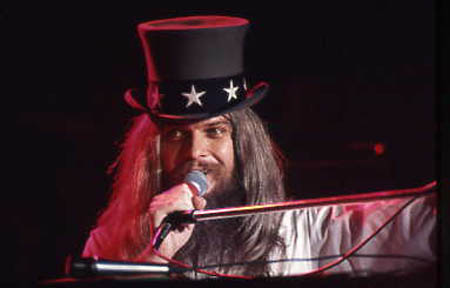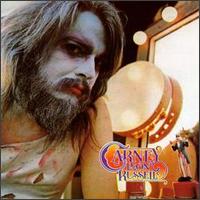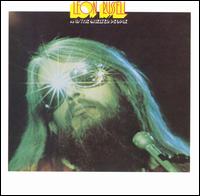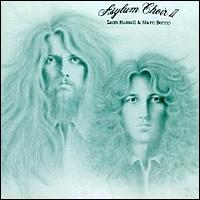Leon Russell

Photo by Stephen Ewing. Knoxville, TN - 1973
His early solo years
by Ryan Settee
(June 2010)
Trying to do a proper article on Leon Russell is pretty difficult. There's a ton of angles that you could go with, simply because he's so varied and diverse in his catalog. And of course, he's a man of very few words, which means that it's pretty difficult to get stories out of him for some sort of historical perspective on behind the scenes and other reminiscing that puts it in perspective, beyond the canned "Jerry Lee Lewis sideman" typical bio stuff. At Leon's own website, under the "Leon Speaks" link, it's either pretty funny that the only thing there is the "LEON SPEAKS THROUGH HIS MUSIC" line.... or it's pretty frustrating. Or both. I remember when he played here in Winnipeg maybe 6 years ago, the local newspaper couldn't get an interview with him, so they'd done an article on his history instead. Usually that space is only used for artists doing interviews, but they'd decided to bend the rules for Leon on that one, interview be damned. I'd waited a bit outside his tourbus after that gig in the hopes that I could even just get out an enthusiastic fanboy thing, but he was nowhere to be found. A tad disappointing, but he's notoriously reclusive, and that shouldn't be surprising. The club was packed, but there was a few hundred people there, if that. You'd assume that he'd be playing smaller theatres at least, but I suppose that's what success is, when you're not in it for the fame, just for the music. If you want to get the music out there, fame inevitably comes with it, but if you don't want fame and just want to get the music out there, that's a tough call. People want to know about the person making the music, they want some insight, some information, maybe some dirt. But if you're as intensely private as Leon is, most people aren't accustomed to that stance in the music industry. Which is one of the reasons why he's one of a kind.
But one thing is certain-- he's made a career out of getting down to business and working hard and letting the music be first and foremost, rather than have biography books in hindsight try to legitimize the music through how crazy those days were. I get the impression that some of those bands and people that write those books do more than their fair share of embellishment. In Leon's case, there's no red snappers, there's no snorting of ants, nothing like that. Just the music. And he's always been one of the most fiercely independent, creative and eclectic artists in what could be generally termed the "mainstream" industry, in that he's always been behind the times and has gone back to music's authentic roots, when those things aren't in vogue, when the latest trend could have been mined. He was, and is, never interested in playing the industry game, and perhaps that's why he's far lesser known than he should be in classic rock or nostalgia circles. When I talk to other people about Leon, it's either you know about him or you don't, it's not "kind of heard about..." There's really nothing in between. And everyone that I've known that knows about him, their face lights up, like you've discovered some hidden holy grail. You know that the other person "gets" it.
Throughout his career, he's backed up alot of bands/musicians, and has done a lot of session work (most notably for the Rolling Stones). One of my personal favorites is his work on Dave Mason's Alone Together album. Without going into too many of those records, it's safe to say that he was somewhere on a lot of hits in the late '60's. Just check your liner notes... he's probably in there. One of the best pieces of advice that I've ever heard was that "great leaders were once great followers." Although he undoubtedly liked the session and backup work, it's pretty obvious that he'd always wanted to lead and create his own thing--something that he's done excellently for well over 40 years now. His voice isn't your typical one--it's got a pretty thick Southern drawl, with a bit of a raspy and twangy eccentricity to it (not unlike a distant cousin of Dr. John in some ways) that could easily sound like a put on, but it's the conviction in his voice and playing that gives him his unique delivery and style.
There simply isn't the space to describe everything that he's done to do a proper rundown on all of his albums, or else this writeup would be a book. It's still a bit of a disservice to him, but with the real authentic guys in music's rich history now passing on at an alarming rate, I think that it's especially important to extol the merits of who those remaining guys are. Some of them are obvious, but Leon's one of those guys that have always been kicking around under the radar, doing his thing as a key component on some major albums that some people may not even be aware of; that secret ingredient. He's also released some great solo albums where one gets the sense that he'd got absolute creative control to make those albums. So here I'll focus mainly on the "classic" era to get the point across--not that he hasn't released some great stuff outside of that era, it's just that to absorb someone's career as dense and rich as Leon's, it's important to know where to start.

My introduction to Leon was on a beat up old 8 track cartridge of 1972's Carney. It was in the mid '80's, long after the heyday of 8 tracks. The slightly affected voice was so over the top, that it almost sounded kind of goofy or funny... but there was a real conviction to what was going on. I'd really loved the songs on it--they were slightly eccentric and out there, but there was a real charm to them. Carney goes from some singles type stuff that were more radio friendly ("Tight Rope," "Roller Derby," "Out In The Woods") and some singer-songwriter stuff ("Me And Baby Jane," "My Cricket"), so there's a good blend of material. Where it really gets interesting though is the warped carnival music track, "Carney,"and "Acid Annapolis" which literally sounds like a ghosts doing acapella. It's one of the weirdest and most interesting pieces of music that i've ever heard committed to recording and the liner notes don't specify anything about it. Most of the instrumentation was done by Leon on the record, but "Acid Annapolis" sounds like a bunch of people, and certainly nothing like Leon's stuff or his singing. It's really bizarre. But then, two songs later, the classic "This Masquerade" (most notably covered by George Benson) unfolds, and both it and "Magic Mirror"--a sparse piano track backed by metronomic click-track percussion--close out the album. I should also mention that I was only 7 or 8 years old at this time, so it was pretty perplexing to say the least, but it was his voice and how much this guy rocked on a piano that had really impressed me. I was used to guitars always being front and center, but not on this recording.
Important to note, as well, is that before the home recording craze much later, Leon had made a home-recorded album and got it in the charts with Carney. That's pretty impressive, and I don't think that he's really got much credit for that in the grand scheme of things. The reissue of Carney on The Right Stuff--much like alot of the CD issues of CD's in the 80's with the "due to the limitations of analog equipment..." statements says:
"Thanks to MCA Records for furnishing the original master tapes used to make this compact disc. Since most of the selections were in fact recorded in Leon Russell's home studio without the benefit of Dolby noise reduction circuits, tape hiss is noticeable. To have removed it in the mastering process would have compromised the integrity of the performance"- Steve Hoffman (from the liner notes)
Over the years, I'd picked up other albums by him, and wasn't disappointed. The styles range wildly from gospel to honky tonk to '50's rock and country and psychedelia-- but he's equally adept at all of them. The obvious first choice in his catalog (Carney may be too eclectic for some), is the self-titled album from 1970. Featuring many of his pals from session work and in the industry--George Harrison, Eric Clapton, Steve Winwood, Bill Wyman, Charlie Watts, etc--it's a real who's who of the industry at that time. Appropriately, it sounds like it, and if Carney has an upside at times with it's lo-fi home produced intimacy within it's largely self performed album--it's that it doesn't have the overall conviction for many talents trying to vie for their specific flavours, which makes Leon Russell better in that regard. The self-titled album is also Leon at his most focused--other than, perhaps, Leon Russell and the Shelter People. It's mostly Leon in his rocking honky tonk R&B gospel mode--"I Put A Spell On You," "Prince Of Peace," "Give Peace A Chance," "Roll Away The Stone"---it's all Southern swamp gospel rock goodness. The highlights for me though are the slower acoustic "Hummingbird" (later covered by B.B. King) and "A Song For You." The latter is especially an interesting choice to start off an album that's largely filled with uptempo rockers--usually you have a faster, catchier song to open an album, but then again, Leon has never done anything typical in his career. Here you have a song that's just piano, vocals and a faint wind section with Leon extolling his life on the road, reflecting lyrically but also musically, as well, with its minor key baroque touches. "I've been so many places in my life and times... I've sung alot of songs, I've made some bad rhymes... I've acted out my love in stages with ten thousand people watching, but we're alone now and I'm singing this song to you". It's a real ode to the fan. Not to be overlooked is Glyn Johns' production/ mix on the album, which is clear and upfront.

Leon Russell and the Shelter People (1971) is another excellent album in his catalog. Perhaps leaning more towards the gospel rock thing that was on the first album, this album holds up well in the sense that he'd had a real full time band at this point, other than guests and fellow do everything yourself collaborators like Marc Benno (more on him later). Actually, despite the first self-titled album getting the nod as the obvious choice for a first and/or possibly only Leon album for the less initiated or casual fan, I'd say that The Shelter People is its equal. It really sounds like a band at the top of their game, firing on all cylinders--all the backing soul singers and the "music as religion" explosion. There's really fire and conviction in the playing, and it sounds like a true collective of musicians playing big ensemble music that are playing off of each other, going back earlier to the '50's and '60's when you'd get a bunch of players all playing live in the same room (the false starts on "I Put A Spell On You" on Leon Russell would also indicate this). Despite the fact that there's songs done at different sessions/places with different bands, the album sounds very cohesive. Of note, the mix engineer was John Fry at Ardent Studios in Memphis; keeping with the quality of releases that had gone through there. "Stranger In A Strange Land" leads off the album- a slower tempo and reflective number with an excellent chorus. From there on out, it's the usual blend of good time rockers ("Of Thee I Sing," "Crystal Closet Queen," "Alcatraz," etc.), some singer songwriter tracks ("Home Sweet Oklahoma"), and the usual Dylan worship ("It's A Hard Rain Gonna Fall,""It Takes Alot To Laugh, It Takes A Train To Cry") and a song written for Joe Cocker's Mad Dogs and Englishmen, "The Ballad Of Mad Dogs And Englishmen".
His Hank Wilson alter ego, in which he released country music, is the real deal. Back in 1973, he put out Hank Wilson's Back, an album of old country classics- covers by Hank Williams, Lester Flatt, Bill Monroe, etc.. It's no paint by numbers re-creation though- he nails the spirit, enthusiasm and drunken recklessness that made the originals so good, and with his thick Southern drawl, it gives the songs a swampier, tougher, more rockabilly feel. It's a real Saturday night album, but the slower hurtin' songs make it a great Sunday morning hangover record. Beating out the old country revival by a decade or three (i.e. Mike Ness' "Cheating At Solitaire," for example), it's a real throwback to the late '40's/'50's country- standup bass, banjo, dobro, etc. At this point in his career, Leon was doing a different style on every album--he'd never put out the same album twice. A lot of the Hank Wilson album has the kinetic energy of bluegrass, but as a result, it almost has a punk feel- the rowdy, unhinged energy on songs like "Uncle Pen," "Truck Drivin' Man" and the sped up second half of "Roll In My Sweet Baby's Arm" all sound like a precursor to Jason and the Scorchers' merging of country and punk in the '80's- the true outlaw music. The real standouts are "She Thinks I Still Care," "The Window Up Above" and "Am I That Easy To Forget?", the latter with its Mellotron strings and shuffle that nails the hurtin' vibe that it's after. Many have covered it, but few with this much conviction and soul. JJ Cale co-produced the album and plays guitar on most cuts as well.

Perhaps the other most interesting album in Leon's catalog, is the Asylum Choir stuff; done in conjunction with fellow multi-instrument player Marc Benno. The Look Inside (1968) and Asylum Choir II (1971) albums are interesting and are an anomaly in Leon's repertoire in that they're slightly disjointed psychedelic pop that has an almost celestial feel at times. Undoubtedly influenced by the Beatles' experiments in the studio on Sgt. Pepper's and "Yellow Submarine" in particular, the Asylum Choir stuff perhaps gets buried in Leon's catalogue, maybe because it was his first attempts at recording his own material. For some reason, it's not considered amongst Leon's classic material, possibly because it's much different in style (the psychedelic explosion of colors on the cover of Look Inside being an obvious tip off). Personally, I think that it should be, and is at least worth a listen, because the basis for Leon's piano boogie is definetely there, and it gives a glimpse of how good he's always been as a player and co-producer, when left to his own creative devices. There's some really interesting songs on here--some that stop and start that are seemingly spliced together--but there's alot of studio tricks and overdubs and sounds that filter in and out of the mix, and most of the songs are 2 to 3 minutes long, so they move along quickly. The production, itself, is immaculate--it's clear and crystalline and immediate, like Big Star's #1 Record, with hard stereo panning and the stereo field being used heavily. If there could be any complaints about it, it's that it's often a bit unfocused.
There's a song, ("Intro To Rita") where Leon's bouncing two different piano parts off Rita Coolidge to see what she thinks; a working studio piece that's a tad out of place (a much better placement would be at the end of the album), but it gives an insight as to their working methods at that time. The re-release of Asylum Choir II has 5 bonus tracks; all of which were on Look Inside, comproming most of that release. As far as touring these two albums, I'm not sure if they did, or if they even played them out live--it really seems like a studio only thing, and information on these records and about Leon and Marc around this time is extremely rare.
"Leon Live" (1973), of course, can't be without mention. It's a triple LP of live material from around '72, right in the middle of his work with Joe Cocker and Dave Mason and others, in the "classic" era. It's interesting to note that it had been his last stab at the big ensemble R&B music that he'd make for awhile that had otherwise typified his first two albums--moving away from that to the more singer/songwriter feel of most of Carney; the old country feel of Hank Wilson's Back and the little bit of everything Will O The Wisp. But it's a grand exit of that style, indeed.
Leon may not be as well known as some of his peers and contemporaries, but make no mistake, he is surely often almost never with actual peer. Most bands and musicians can't boast the legacy of playing and material that he's put out. And he's still out there touring, all in the name of the music. The more that the world moves on and the more that bands, artists and trends come and go, it's reassuring to know that some things never change. He'd rocked out at the recent 2010 Grammy's (jamming with the Zac Brown Band)-- entering and then receding from public view as unassuming as you can when you're sporting an all white cowboy hat/hair/beard combo; like a rock n' roll Santa Claus giving you the gift of rock n' roll and then making his way back up the chimney again.